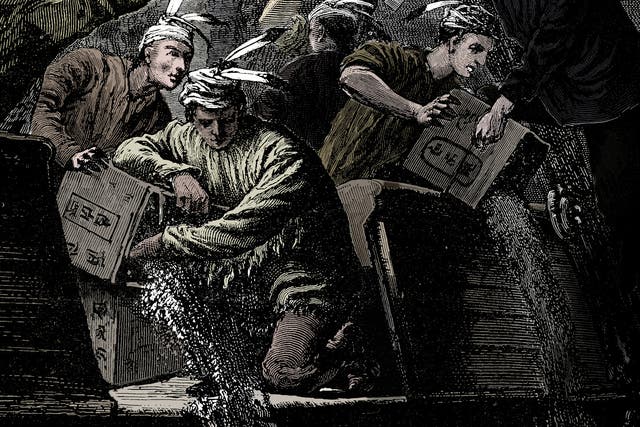

The Tea Act of 1773 was one of several measures imposed on the American colonists by the heavily indebted British government in the decade leading up to the American Revolutionary War (1775-83). The act’s main purpose was not to raise revenue from the colonies but to bail out the floundering East India Company, a key actor in the British economy. The British government granted the company a monopoly on the importation and sale of tea in the colonies. The colonists had never accepted the constitutionality of the duty on tea, and the Tea Act rekindled their opposition to it. Their resistance culminated in the Boston Tea Party on December 16, 1773, in which colonists boarded East India Company ships and dumped their loads of tea overboard. Parliament responded with a series of harsh measures intended to stifle colonial resistance to British rule; two years later the war began.
In 1763, the British Empire emerged as the victor of the Seven Years’ War (1756-63). Although the victory greatly expanded the empire’s imperial holdings, it also left it with a massive national debt, and the British government looked to its North American colonies as an untapped source of revenue. In 1765, the British Parliament passed the Stamp Act, the first direct, internal tax that it had ever levied on the colonists.
The colonists resisted the new tax, arguing that only their own elective colonial assemblies could tax them, and that “taxation without representation” was unjust and unconstitutional. After the British government rejected their arguments, the colonists resorted to physical intimidation and mob violence to prevent the collection of the stamp tax. Recognizing that the Stamp Act was a lost cause, Parliament repealed it in 1766.
If Parliament expected that the lowered cost of tea would mollify the colonists into acquiescing to the Tea Act, it was gravely mistaken. By allowing the East India Company to sell tea directly in the American colonies, the Tea Act cut out colonial merchants, and the prominent and influential colonial merchants reacted with anger. Other colonists viewed the act as a Trojan horse designed to seduce them into accepting Parliament’s right to impose taxes on them. The fact that the agents commissioned by the company to sell its tea included a number of pro-Parliament men only added fuel to the fire.The Tea Act revived the boycott on tea and inspired direct resistance not seen since the Stamp Act crisis. The act also made allies of merchants and patriot groups like the Sons of Liberty. Patriot mobs intimidated the company’s agents into resigning their commissions. In several towns, crowds of colonists gathered along the ports and forced company ships to turn away without unloading their cargo. The most spectacular action occurred in Boston, Massachusetts, where on December 16, 1773, a well-organized group of men dressed up as Native Americans and boarded the company ships. The men smashed open the chests of tea and dumped their contents into Boston Harbor in what later came to be known as the Boston Tea Party.
Colonists didn't just take up arms against the British out of the blue. A series of events escalated tensions that culminated in America's war for independence.
For starters, the colonists weren't protesting higher taxes on tea.
The massive British corporation was founded under Queen Elizabeth I and rose to exploit overseas trade and become a dominating global player.
The Boston Tea Party caused considerable property damage and infuriated the British government. Parliament responded with the Coercive Acts of 1774, which colonists came to call the Intolerable Acts. The series of measures, among other things, repealed the colonial charter of Massachusetts and closed the port of Boston until the colonists reimbursed the cost of the destroyed tea. Parliament also appointed General Thomas Gage (1719-87), the commander in chief of British forces in North America, as the governor of Massachusetts. Since the Stamp Act crisis of 1765, radical colonists had warned that new British taxes heralded an attempt to overthrow representative government in the colonies and to subjugate the colonists to British tyranny. The Coercive Acts convinced more moderate Americans that the radicals’ claims had merit. Colonial resistance intensified until, three years after Parliament passed the Tea Act, the colonies declared their independence as the United States of America. The American Revolution had begun.
HISTORY.com works with a wide range of writers and editors to create accurate and informative content. All articles are regularly reviewed and updated by the HISTORY.com team. Articles with the “HISTORY.com Editors” byline have been written or edited by the HISTORY.com editors, including Amanda Onion, Missy Sullivan, Matt Mullen and Christian Zapata.